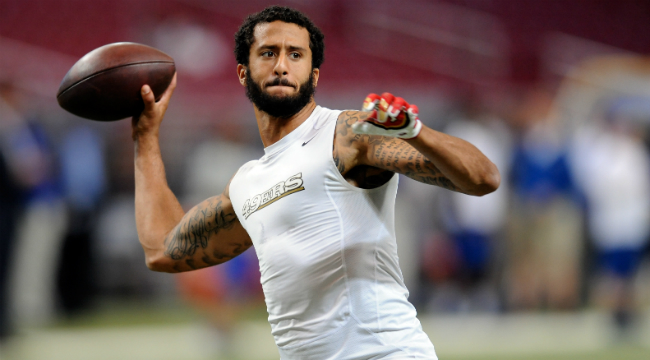
Last week, San Francisco 49ers quarterback Colin Kaepernick started a media firestorm when, prior to a game, he refused to stand during the national anthem. Naturally, there were those who saw it as un-patriotic, a slap in the face to the men and women serving in our military and risking their lives on a daily basis and an attack on the very idea of America as a shining city on a hill.
But there’s a counterpoint to that argument. Kaepernick, who is bi-racial, says the reason he refused to stand was to protest black oppression in this country. He became just the latest in a string of professional athletes — including several NBA players such as Carmelo Anthony, Chris Paul, Dwyane Wade, and LeBron James — to speak out on the highly-politicized issues plaguing the black community today.
There’s an argument to be made that Kaepernick’s protest and others like it (flag burning, for instance) are themselves an act of patriotism, a fulfillment of our First Amendment right to free speech. After all, the ability to openly criticize your government, free of consequence from said leaders, is a foundational American value.
That, of course, doesn’t mean entirely free from consequence. For Kaepernick, there was clearly great personal risk involved. He’s quickly become a pariah in the eyes of a large portion of the population, and there’s already been talk that he could potentially be released by the 49ers.
NBA legend Kareem Abdul-Jabbar, a staunch and outspoken Civil Rights proponent throughout his career and beyond, believes we should celebrate Kaepernick and that there is great hypocrisy involved in how the conversation has hinged on a debate about free speech rather than his initial protest about black inequality in America.

Here’s what he had to say in a piece he wrote for the Washington Post on Tuesday:
What should horrify Americans is not Kaepernick’s choice to remain seated during the national anthem, but that nearly 50 years after Ali was banned from boxing for his stance and Tommie Smith and John Carlos’s raised fists caused public ostracization and numerous death threats, we still need to call attention to the same racial inequities. Failure to fix this problem is what’s really un-American here.
There’s reason for optimism, however.
The world of professional sports has become increasingly involved in the political arena recently and has a unique opportunity to use that platform to affect social change. Abdul-Jabbar knows this well, and as he’s said on previous occasions, it’s much harder to respect a high-profile athlete who is more concerned with their personal brand than using their clout to do something positive in the world.






